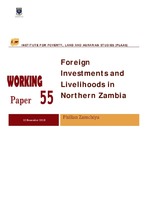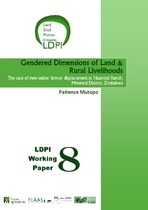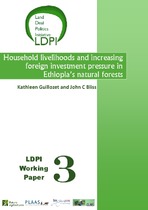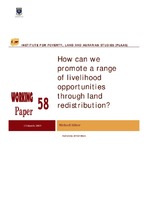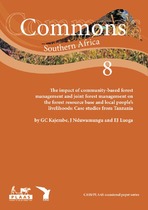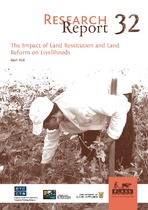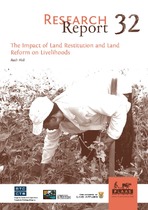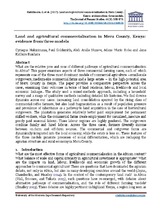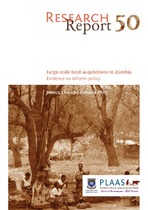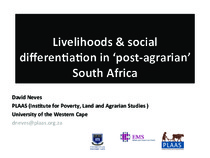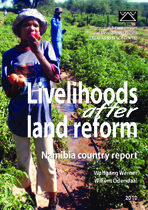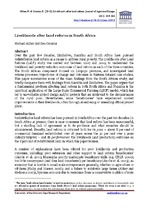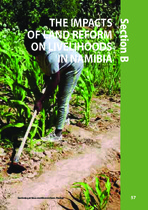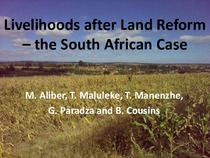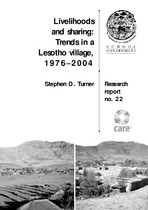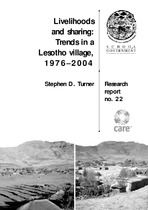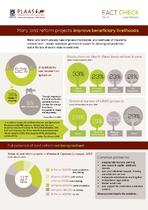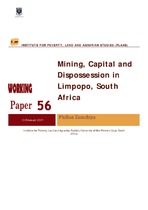Browsing by Subject "Livelihoods"
Now showing items 21-40 of 54
-
Foreign investments and livelihoods in northern Zambia
(Institute for Poverty, Land and Agrarian Studies, University of the Western Cape, 2018-12)This study employs a wider livelihoods approach to challenge some insular neo-classical economic narratives on the nature, process and impact of large-scale land acquisitions on smallholder farmers living on Africa’s ... -
Gendered dimensions of land and rural livelihoods: The case of new settler farmer displacement at Nuanetsi Ranch, Mwenezi District, Zimbabwe
(Institute for Poverty, Land and Agrarian Studies, University of the Western Cape, 2012)Nuanetsi Ranch had been invaded by villagers from different parts of Mwenezi, Chiredzi and Chivi communal areas since 2000. In February 2010, the government announced that the settlers had to be removed and resettled in ... -
Household livelihoods and increasing foreign investment pressure in Ethiopia’s natural forests
(Institute for Poverty, Land and Agrarian Studies, University of the Western Cape, 2011)Foreign investment in Ethiopia’s forestry sector is currently limited, but agricultural investments that affect forests — largely through forest clearing — are commonplace. We describe the nature of forest investments ... -
How can we promote a range of livelihood opportunities through land redistribution?
(Institute for Poverty Land and Agrarian Studies (PLAAS), 2019)This position paper sketches an approach to improving land redistribution in South Africa in which the broad aim is to use redistribution to create a range of livelihood opportunities, in meaningful numbers, in proportion ... -
The impact of community-based forest management and joint forest management on the forest resource base and local people’s livelihoods: Case studies from Tanzania
(Institute for Poverty Land and Agrarian Studies (PLAAS), 2004)In recent years, there has been a move in eastern and southern African countries from centralised and state-driven management of natural resources towards decentralised and people-centred based regimes. In Tanzania, the ... -
The impact of land restitution and land reform on livelihoods
(Institute for Poverty, Land and Agrarian Studies, University of the Western Cape, 2007)This thematic paper investigates emerging trends evident in the limited literature available on the impact of land restitution on livelihoods, and suggests ways of thinking about, and planning for, livelihoods. The ... -
The impact of land restitution and land reform on livelihoods
(PLAAS, University of the Western Cape, 2007-08)This report investigates emerging trends evident in the limited literature available on the impact of land restitution on livelihoods, and suggests ways of thinking about, and planning for, livelihoods. The report has ... -
Land and agricultural commercialisation in Meru County, Kenya: evidence from three models
(Taylor & Francis, 2017)What are the relative pros and cons of different pathways of agricultural commercialisation in Africa? This paper examines aspects of three commercial farming cases, each of which represents one of the three most dominant ... -
Large-scale land acquisitions in Zambia: Evidence to inform policy
(Institute for Poverty, Land and Agrarian Studies, University of the Western Cape, 2015)Land in Zambia plays a vital role in sustaining livelihoods, ensuring food security and reducing poverty. If people are not able to access land (including communal interests, such as lands for grazing or access to water ... -
Livelihoods & social differentiation in ‘post-agrarian’ South Africa
(2017)• Legacy: Settler colonialism & migrant labour • Industrialization & proletarianisation • Dichotomous agrarian landscape • Rural poverty, esp. former homelands • Longstanding deagrarianisation -
Livelihoods after land reform
(Institute for Poverty, Land and Agrarian Studies, University of the Western Cape, 2010)In 1990, Namibia emerged from colonial rule with a skewed distribution of agricultural land and high levels of poverty. The new government led by SWAPO Party initiated a process to address the land question within the ... -
Livelihoods after land reform in South Africa
(Wiley, 2013)Over the past few decades, Zimbabwe, Namibia and South Africa have pursued redistributive land reform as a means to address rural poverty. The Livelihoods after Land Reform (LaLR) study was carried out between 2007 and ... -
Livelihoods after land reform: Namibia country report (2010)
(Land, Environment and Development Project, Legal Assistance Centre, 2010) -
Livelihoods after land reform: Namibia country report (2010) Section B
(Land, Environment and Development Project, Legal Assistance Centre, 2010)The first AALS farmers in Hardap obtained their land in 1992, and the most recent in 2003. In Omaheke, the first AALS farmer obtained his farm in 1992 and the most recent, a woman, in 2000. Thus in both regions the oldest ... -
Livelihoods after land reform: The impacts of land reform on livelihoods in Namibia: Section B
(Institute for Poverty, Land and Agrarian Studies, University of the Western Cape, 2010)The first AALS farmers in Hardap obtained their land in 1992, and the most recent in 2003. In Omaheke, the first AALS farmer obtained his farm in 1992 and the most recent, a woman, in 2000. Thus in both regions the oldest ... -
Livelihoods after land reform: The South African case
(Institute for Poverty Land and Agrarian Studies (PLAAS), 2012)SA’s land reform regarded as a failure – economic objectives – the spectre of ‘failed projects’ – changing the racial pattern of land ownership – too slow • No consensus as to why, or what to do • Even so, ambitious ... -
Livelihoods and sharing: Trends in a Lesotho village, 1976–2004
(Institute for Poverty, Land and Agrarian Studies, University of the Western Cape, 2005)In 2004 I was fortunate enough to be able to return to Ha Tumahole, the village in Lesotho where I undertook research on farming and livelihoods in 1976–77, and spend four weeks learning about what had changed in ... -
Livelihoods and sharing: Trends in a Lesotho village, 1976–2004
(PLAAS, University of the Western Cape & Cooperative for Assistance and Relief Everywhere Inc. (CARE), 2005-10)The study compares the livelihoods and inter-household sharing mechanisms in a Lesotho village across a 28 year period. The report examines the complex socio-economic structures and systems that are in place in the rural ... -
Many land reform projects improve beneficiary livelihoods
(Institute for Poverty Land and Agrarian Studies (PLAAS), 2013)Many land reform projects have improved the incomes and livelihoods of those who received land – despite inadequate government support for planning and production, and in the face of severe resource constraints. -
Mining, capital and dispossession in Limpopo, South Africa
(Institute for Poverty Land and Agrarian Studies (PLAAS), 2019)This Working Paper explains the processes by which land, water and other natural resources were seized, and their previous users dispossessed, for the purposes of capital accumulation by Ivanplats platinum mining company ...

